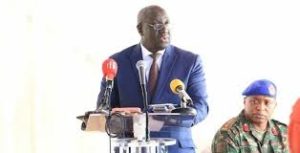The retreat was meant to outline a clear path for the security sector reform in the country, a process that that will be owned by Gambian people.

Head of security institutions in the Gambia, senior civil servants and international experts from Economic Community of West African States (ECOWAS) and African Union have concluded a two-day retreat where authorities have defined the path to reform the country’s security sector.
The retreat which was opened by the vice president Ousainou Darboe on Tuesday was led by country’s national security adviser, Momodou Badgie.
Following their two-day meeting at Kairaba Beach Hotel, Badgie told journalists that they have identified “internal and external challenges that militate against” the prospects of stability of the Gambia.
“Throughout our discussions, there have been common threats which commanded the consensus of all of us here. They are the dire need of strong ownership of the security sector reform process in the Gambia especially by Government and the security institutions, the need to fund or mobilise resources for some of the priority projects and programmes,” Badgie said.
The retreat was funded by ECOWAS. The regional bloc is playing an active role in ensuring lasting security in the Gambia since the end of dictatorship in the country.
Other partners such as the European Union, Turkey, France and United Nations are playing a key role in the country’s security sector reforms process.
“It was also indicated that there is a need to strengthen our institutions, the need to get human resources and get newly established office of the national security on course and operational,” said Badgie.
“We also need to accelerate the pace of our security sector reform process…We have realized that there is a need to regularize our joint meetings at the level of the security institutions.”
Badgie is a former military colonel and diplomat. He served as ambassador to Turkey before returning to the country following the fall of the former ruler Yahya Jammeh.
“One clear idea that came out of our discussions is how much deficit we have in our security sector reform especially in terms of ownership, collaboration and coordination…,” he added.
Gambia went through two-decade dictatorship which commentators said has severely affected its military and other security institutions.
As a result, the relations between the country’s security and the population has been seriously affected.
Though a large number of the Gambia army had no records of killing for Jammeh, a tiny section call the Jugglers were blamed for several murders, tortures and disappearances.

